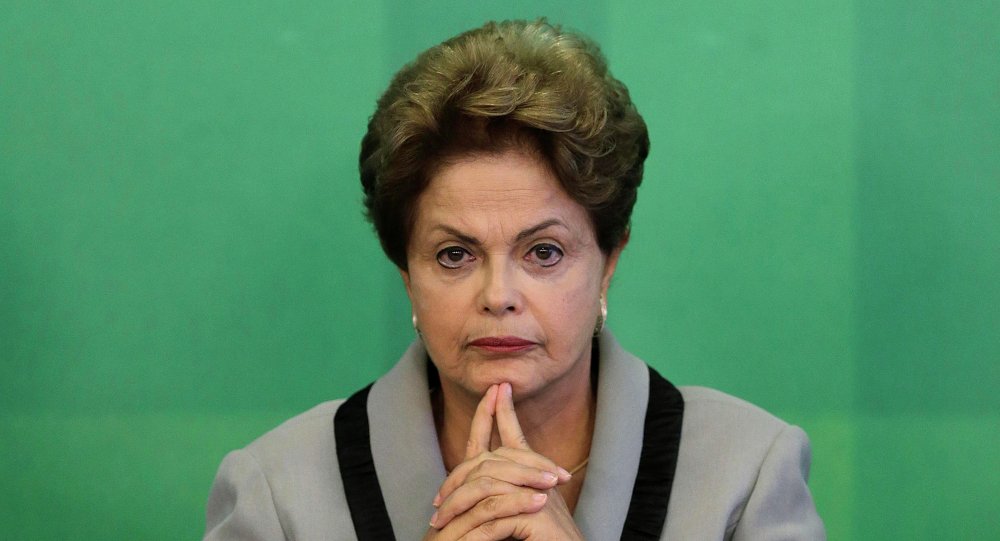Secrets and Scandals Around Dilma Rousseff’s Impeachment
On August 31, Dilma Rousseff was removed from office and Michael Temer was sworn in.
Brazil’s suspended President Dilma Rousseff attends the final session of debate and voting on Rousseff’s impeachment trial in Brasilia, Brazil, August 29, 2016 © REUTERS/ Ueslei Marcelino Brazilian Senate Definitively Dismisses Dilma Rousseff as President of Brazil
At the final Senate hearings, 59 senators voted for Rousseff’s resignation(when only 54 votes was necessary for the impeachment to go through).
As a result, on August 31, by 61 votes to 20, Dilma Rousseff’s impeachment was declared.
The ongoing crisis in the political life of Brazil, high-profile corruption scandals and explicit intervention from the outside (first of all, the US), has done nothing to help the economy, RIA Novosti columnist Anastasia Melnikova wrote.
US intelligence and Dima Rouseff’s impeachment
In addition to local oligarchy involvement in the fight against the “Iron Lady of Brazil,” Michel Temer, who took Rousseff’s place, played a great role in the impeachment process.
At the time, when Temer was vice-president, he was supportive of Dilma Rousseff. However, just before the impeachment proceedings, Temer went over to the opposition party held by Eduardo Cunha, chairman of the lower house of parliament, who once was a suspect in corruption activities.
It was a parliamentary initiative and a subsequent vote that began the impeachment proceedings.
WikiLeaks revealed that in May 2016 Temer was providing the US National Security Council and the US military with Brazilian political information, making Temer “the embassy informant.”
But the greatest scandal involving US surveillance and Brazilian high ranking officials erupted in 2013.
Documents provided by Edward Snowden showed that US intelligence agencies monitored phone messaging and online correspondence of the presidents of Brazil and Mexico.
Also, there is evidence that US intelligence accessed both Rousseff’s assistants and Brazilian state oil company Petrobras management’s private information.
At the time, Dilma Rousseff canceled a long-planned visit to the United States, after which Barack Obama had to issue a statement, sending apologies.
However, the American wiretapping incident was closed in July 2015, when Dilma Rousseff made a visit to the United States.
Dilma Rousseff’s political past and future
During Rousseff’s first presidential term (2010-2014), social inequality in the country reached its lowest in the last 50 years, driving her popularity to unprecedented levels.
In 2011, Brazil was able to surpass the UN’s “Millennium Plan,” which aims to reduce poverty by 50 percent by 2015. Revenues of the poorest citizens had increased by more than 52 percent.
However, during Rousseff’s second presidential term, everything came unhinged. In 2015, GDP declined by 3.8 percent and was expected to fall by another 3.1 percent in 2016.
Unemployment increased, reaching the highest ever recorded, 11 million people werewithout work, inflation increased and economic activity fell by almost 4 percent over the last year.
Dilma Rousseff explained these indicators by pointing towards strong political opposition in the country, especially when parliamentary opposition blocked government initiatives. According to the ex-president, MPs defended the opposition coalition, which mainly had the interests of oligarchs, arms manufacturers, breeders of cattle and of some religious leaders in mind.
Dilma Rousseff denies her involvement in tax crimes and illegal use of state funds, blaming opposition figures in these corruption schemes and accusing them of committing a coup.
“All my life is a struggle,” said Dilma Rousseff. “I was a Marxist underground fighter, I was put in prison, and I know for sure what is the inside process of my country’s transformation.”
In 1970, Dilma was arrested and put in prison, where she was beaten and tortured with electricity. In 2009, Rousseff recovered from lymph node cancer, and in 2010, Rousseff became the first woman president of Brazil.
Dilma Rousseff still has a chance to continue the political struggle. As a result of a single vote in the Senate, the ex-president will not be fully deprived of the the opportunity to hold public office.
___
http://sputniknews.com/latam/20160902/1044902610/scandal-dilma-rousseff-impeachment.html
